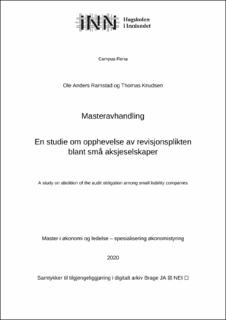| dc.contributor.author | Ramstad, Ole Anders | |
| dc.contributor.author | Knudsen, Thomas | |
| dc.date.accessioned | 2021-08-12T12:31:24Z | |
| dc.date.available | 2021-08-12T12:31:24Z | |
| dc.date.issued | 2020 | |
| dc.identifier.uri | https://hdl.handle.net/11250/2767611 | |
| dc.description | Spesialisering økonomistyring | en_US |
| dc.description.abstract | I 2011 ble det besluttet at små aksjeselskaper innenfor gitte terskelverdier hadde mulighet til å velge bort revisjon (Revisorloven § 2-1, 2016). Lovendringen ble kritisert av Økokrim og Skatteetaten, hvor argumentet var at dette åpnet muligheten for skattekriminalitet. Ved å fjerne revisor som kontrollelement i den finansielle rapporteringen svekker dette selskapenes næringsoppgaver. Skatter og avgifter er den største inntektskilden i statsbudsjettet og bidrar til å finansiere velferdsordninger. Avhandlingen er av interesse for aktører som har utrykt sin misnøye for lovendringen, skatte- og avgiftsmyndigheter og andre grupper som er forkjempere av økonomisk kriminalitet. På bakgrunn av dette presenteres følgende problemstilling: «Betaler selskaper uten revisor mindre skatt?» For å besvare problemstillingen er det utviklet fire hypoteser som tar utgangspunkt i teori og empirisk forskning. Utvalget ble analysert gjennom beskrivende statistikk og hypotesene ble testet gjennom en lineær multippel regresjonsanalyse. I tillegg til avhandlingens problemstilling ble nyetablerte selskaper, lønnsomhet og fravalgsandel undersøkt for selskaper innenfor risikobransjer. Avhandlingen presenterer tre forskningsspørsmål som skal gi retning for forstudiene og bygger på empiriske funn og tidligere forskning. Utvalget tar utgangspunkt i registerdata innsamlet fra Bisnode som baseres på regnskapsårene 2015-2019. Bransjene som ble undersøkt er bilpleie, frisering og skjønnhetspleie, maler og glassarbeid, budbil, restaurantvirksomhet og snekkerarbeid. Forstudiene viser at det etableres flere selskaper etter at lovendringen ble innført, samtidig som det er høy fravalgsprosent av revisjon. Det ble også avdekket at selskaper som har valgt å beholde revisor viser til et høyere ordinært resultat i den analyserte perioden. Gjennom regresjonsanalysen fant avhandlingen at bruk av revisortjenester påvirker selskapenes skattekostnad, ved at denne er høyere blant selskapene med revisor. Videre ble det funnet en sterkere sammenheng mellom selskapenes kapitalbase og skattekostnad hvor selskaper med lavere aksjekapital betaler mindre skatt. Det ble også funnet at ordinært resultat og størrelse har en positiv påvirkning på skattekostnad hvor selskaper som betaler mindre skatt har et lavt antall ansatte. | en_US |
| dc.description.abstract | Abstract
In 2011 small limited liability companies within given threshold values, were allowed to opt out of audit (Revisorloven § 2-1, 2016). The amendment was criticized by Økokrim and Skatteetaten, where they predicted that it would lead to increased possibilities of tax-crime. By removing auditing which is an element of control in the financial reporting this weakens the companies general trading statements. Taxes and fees are the biggest source of income in the national budget and contributes to finance welfare-arrangements. The thesis is of interest for actors who have expressed their dissatisfaction for the change of law, tax authorities and other groups that is advocated for economic crime. Based on this the thesis question is presented as follows: “Do companies without audit pay less taxes?” To answer the thesis question, this study has developed four hypotheses which are based on theory and empirical research. The sample was analyzed through descriptive statistics and the hypotheses was tested through a linear multiple regression. In addition to the thesis question, new developed companies, profitability and opt-out share analyzed through companies within risk-industries. The thesis contains three research questions which leads to feasibility studies and are based on empirical findings. The sample are based on company data from Bisnode which contain accountings from 2015-2019. The analyzed industries are car care, hairdressing, painter, delivery services, restaurants and carpenters. The feasibility studies shoves that it established more companies after the amendment was introduced, at the same time it is high opt-out of auditing. There was also discovered that companies that kept auditing has bigger profitability in our analyzed period. Through regression analyze the thesis discovered that audit services affect companies’ taxes where this is higher among companies with audit services. Further, there was a strong connection between companies’ capital base and their taxes, where companies with low stock capital pays less taxes. In addition to this, profitability and size of the company has a positive impact on taxes, where companies that pay less taxes have decreased amount of employees. | en_US |
| dc.language.iso | nob | en_US |
| dc.subject | Joint-Stock Company | en_US |
| dc.subject | aksjeselskap | en_US |
| dc.subject | revisjon | en_US |
| dc.subject | Audit | en_US |
| dc.subject | Tax | en_US |
| dc.subject | skatt | en_US |
| dc.subject | kvantitativ metode | en_US |
| dc.subject | Quantitative Method | en_US |
| dc.title | En studie om opphevelse av revisjonsplikten blant små aksjeselskaper | en_US |
| dc.title.alternative | A study on abolition of the audit obligation among small liability companies | en_US |
| dc.type | Master thesis | en_US |
| dc.subject.nsi | VDP::Samfunnsvitenskap: 200::Økonomi: 210::Samfunnsøkonomi: 212 | en_US |
| dc.source.pagenumber | 81 | en_US |
